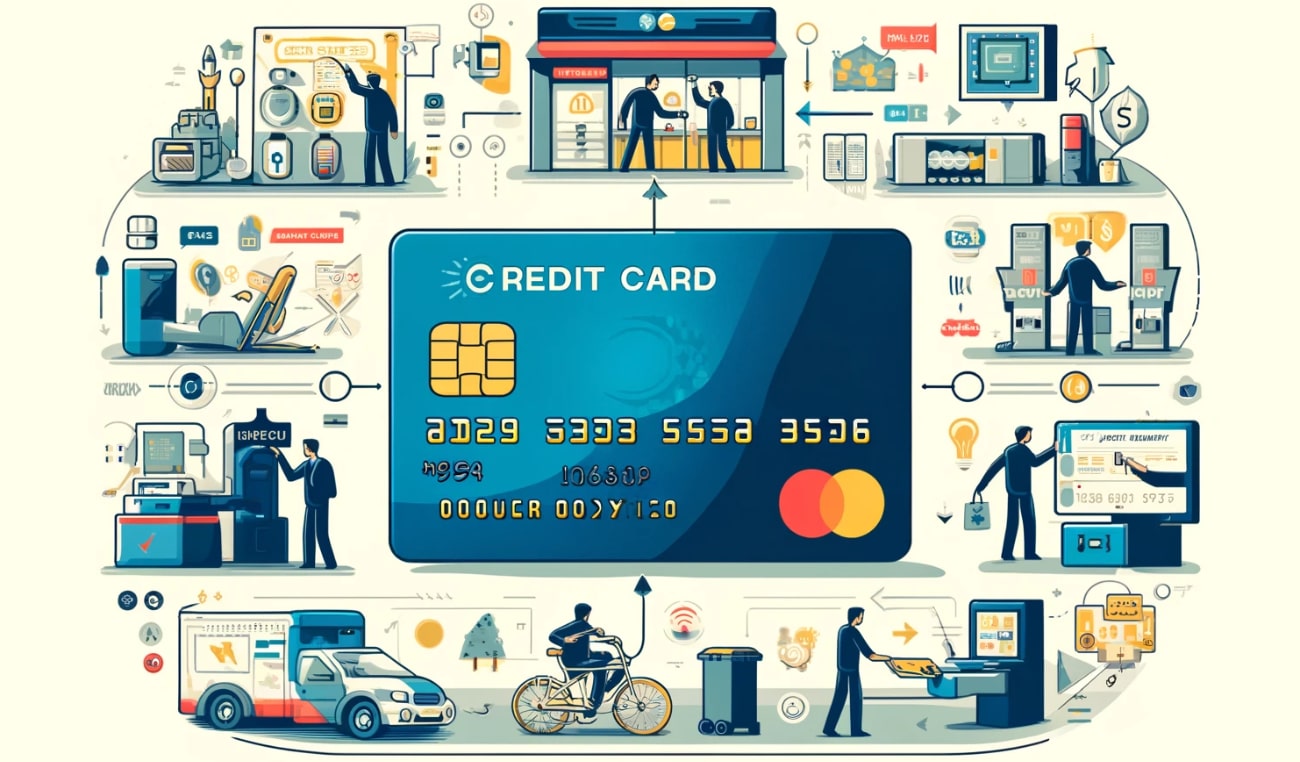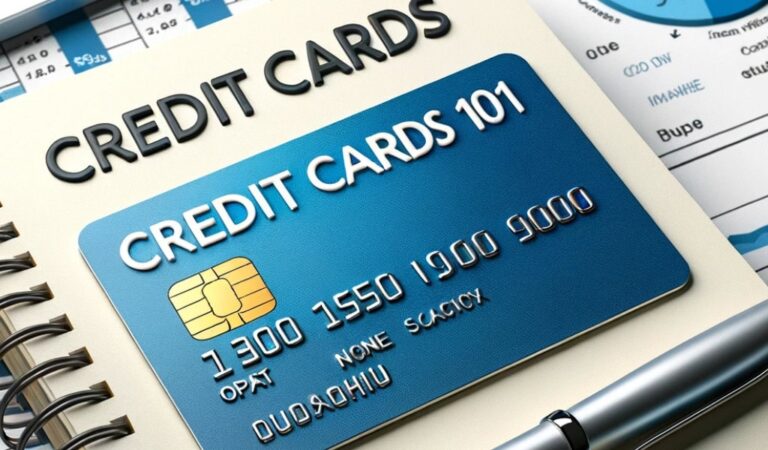Credit cards are everywhere. You can use them to pay bills and make purchases, earn rewards on spending, and even manage your money. But what exactly is a credit card? How does it work? And how do you choose the right one?
Here’s everything you should about getting and using credit cards so you can make smart financial decisions.
What is a credit card?
A credit card is a financial instrument that allows you to spend money you don’t actually have. You pay interest on this borrowed money, but you can use it in many places that would otherwise be off-limits for cash transactions.

A credit card is a way to borrow money from your bank or another financial institution. It’s not like a debit card, which withdraws from an account (you can also check this article on the differences between credit cards and debit cards). Instead, the balance is added to your account (called “charging”) and then paid off over time—usually within 30 days or less—in full or for part by making a payment on the balance owed (called “paying in full”).
When used responsibly and sparingly, credit cards can be great tools. You can;
- Earn rewards points toward purchases at certain stores
- Make payments toward loans easier because they’re automatically deducted each month
- Use them abroad without having currency exchange fees apply
- Get cash advances at ATMs when necessary
- And build up reward points with airlines/hotels/retailers that could translate into free flights or merchandise later on down the road if redeemed before expiration dates expire!
Why you should get one
Getting a credit card is a great way to establish your credit history. Whether you’re applying for your first car loan, apartment rental or mortgage, having a solid credit history makes it easier for you to get approved for new loans and other financial products.
Credit cards are also useful because they can help increase the size of your debt limit over time; this will help build up your credit score even further. ( Discover 5 Ways Credit Cards Can Improve Your Credit Score )
Credit card companies may use information from your monthly bill payments and other sources like public court records and past addresses (if you’ve recently moved) when considering whether or not to approve an application.
While some people might be concerned about sharing such personal information with financial institutions, there are laws that protect consumers against discrimination based on race or gender identity in this process.
How do Credit Cards work?

Credit cards are a form of revolving credit, which means that you can use them to make purchases and pay down your debt over time. They’re also a way to pay for goods and services on credit without having to come up with the cash upfront—you purchase something with your card, then pay back the money over several months.
There are many different types of credit cards available in the US (and throughout the world), but they all work in basically the same way: You get approved for a certain amount of spending power based on your income and other factors as determined by both you and your lender.
When you make purchases with this line of credit (up to a certain limit), you pay interest on that amount until it’s paid off. If there’s interest due at any point during this process, it will accrue daily until you pay it off fully or until another payment is processed against that balance.
Understanding the APR
The APR or annual percentage rate is the interest rate you will be charged on your balance each month. It’s expressed as a yearly rate, but it’s calculated by dividing the annual percentage rate by 12. So if you have an APR of 18%, that means that if you carry a $1,000 balance on your card for one year, you would pay 18% of that balance as interest—or $180 ($1,000 x 0.18).
The rates shown on credit cards are called advertised rates because they’re often lower than what you’ll actually pay (unless you use the card responsibly). In fact, most people never pay their full balance each month; that’s why long-term credit card use can cause so much damage to your finances in the long run.
Understanding Your credit limit on Credit Cards
The credit limit on a credit card is the maximum amount of money you can spend on your card. It’s effectively how much money the bank or lender is willing to lend you, based on factors such as;
- your income
- repayment history
- and other personal data that are stored in your credit report.
The reason this is important to know is because it can be a good indication of how responsible you are with money (or not). The higher your limit, the more likely it is that you’ve managed your credit well in the past.
If you don’t have a large enough limit yet but have been managing your account responsibly over time, then it means that lenders think they could trust lending you more money. Your credit limit may also change over time.
For example: if the issuer sees that other accounts have been opened recently (i.e., someone has been shopping around), they’ll lower their initial offer accordingly. Similarly if there has been no activity on an account for some time and their risk assessment changes accordingly
Secured credit cards vs. unsecured credit cards

Secured credit cards require a deposit in the form of a cash collateral. The deposit is the amount that you are required to pay in order to get your card. In return, you will receive a line of credit that varies depending on how much money is deposited and how good of an applicant you are.
Learn More about Secured Credit Cards
While unsecured credit cards don’t require any sort of payment up front, it’s harder for people with bad or nonexistent credit history to qualify for them (though not impossible). Additionally, unsecured cards can offer higher credit lines than secured cards if they feel confident enough about your ability to repay the debt you’ve incurred.
What are the fees?
Fees for late payments and exceeding your credit limit are standard across all credit cards. However, the fees vary from one card to the next.
If you make a late payment, you can expect to pay up to $39. That’s on top of any interest charges that will be assessed if your payment is even more tardy than that. The fees can easily get worse if you’re not careful.
Similarly, some cards have an annual fee that ranges anywhere from $0-$99 per year. Others charge no annual fee at all (don’t worry: there are plenty of great cards out there with no annual fee). While this isn’t necessarily bad news—after all, those who don’t carry balances won’t have any trouble paying off their balance each month. It’s still something worth considering before choosing one card over another in terms of cost effectiveness or budgeting potentials down the line.
How does interest accrue on Credit Cards?
- Interest accrues on your balance.
- The interest rate is charged on the entire balance of your account, even if you are only carrying a portion of that balance.
- Interest is calculated and charged once per month to all cards with an outstanding balance at or before the end of each calendar month. You’re never charged interest if you pay in full before your grace period ends (see below).
- If you don’t pay off the entire amount within your grace period, interest will begin charging on any remaining balance.
How to chose a credit card
The first credit card you choose should have a low interest rate, no annual fee and a rewards program.
Credit Cards With Signup Bonus of $200.
That’s because your credit will be “new” to the world of lenders. While this may sound intimidating and scary, it’s actually a good thing for those with no debt history at all or who’ve had some challenges financially in the past.
While the exact terms vary by lender, most cards offer 0% intro APR on purchases for anywhere from six months to 18 months (with balance transfers often carrying an even better deal). You can check out these Top 0% APR Balance Transfer Credit Cards.
Bottom Line
Congratulations! You’re now a credit card expert. And if you’re ready to get started, we will be reviewing some great options to consider.
One last tip: once you get your new credit card in the mail, go ahead and leave it at home until you’re sure that you’ve mastered how to use it wisely. If disciplined spending habits are important to you, then getting a credit card may not be the best idea. Do what works for your budget—and have fun!


